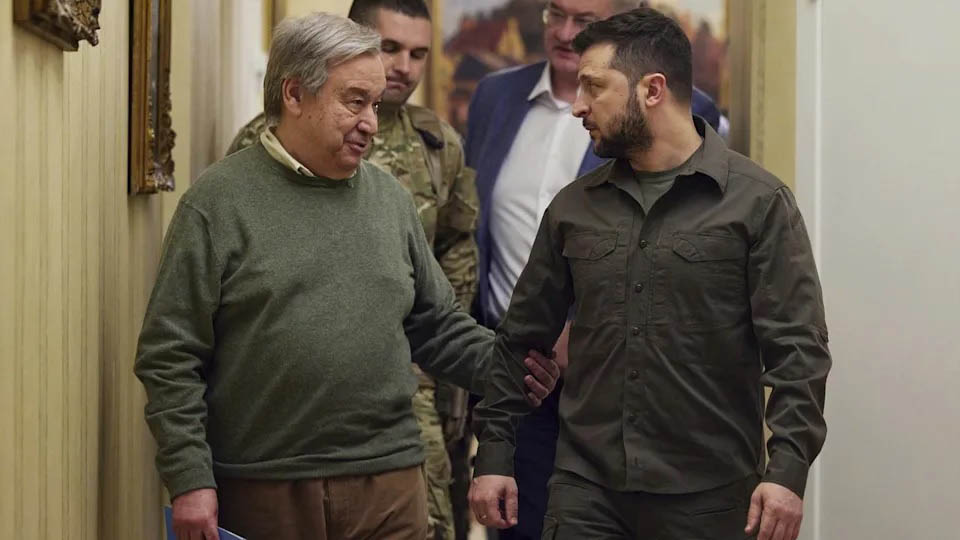KYIV, (Reuters) – Two Russian missiles struck Kyiv during a visit by the head of the United Nations, Ukrainian officials said, but the West believes the battles for the besieged port of Mariupol and other areas in the east and south may determine the war’s outcome.
Russia withdrew its forces from outside Kyiv last month after failing to take the capital and launched a massive attack on Ukraine’s eastern Donbas region.
But yesterday’s blasts in Kyiv, heard soon after U.N. Secretary General Antonio Guterres completed talks with Ukraine’s President Volodymyr Zelenskiy, highlighted concerns that the capital remains vulnerable.
Zelenskiy said the blasts “prove that we must not drop our vigilance. We must not think that the war is over.”
The rockets shook the central Shevchenko district of the city and one struck the lower floors of a 25-storey residential building, wounding at least 10 people, Ukrainian officials said. Reuters witnesses heard two explosions, but their cause could not be independently verified. There was no Russian comment on the blasts.
Russian forces are now entrenched in the east, where Moscow-backed separatists have held territory since 2014, and are holding onto a swathe of the south that they seized in March.
Ukraine’s general staff said Russia was stepping up its military assault in the Donbas.
“The enemy is increasing the pace of the offensive operation. The Russian occupiers are exerting intense fire in almost all directions,” it said.
Moscow’s assault in the east drew new U.S. pledges of military and humanitarian aid for Ukraine yesterday.
Heeding repeated Ukrainian pleas for heavier weaponry, U.S. President Joe Biden asked Congress for $33 billion to support Kyiv, a massive jump in funding that includes over $20 billion for weapons, ammunition and other military aid.
“We need this bill to support Ukraine in its fight for freedom,” Biden said. “The cost of this fight – it’s not cheap – but caving to aggression is going to be more costly.”
Putin calls Moscow’s actions a “special military operation” to disarm Ukraine, defend Russian-speaking people from persecution and prevent the United States from using the country to threaten Russia.
Ukraine dismisses Putin’s claims of persecution and says it is fighting an imperial-style land grab that has flattened Ukrainian cities, forced more than 5 million to flee abroad and killed thousands since the invasion started on Feb. 24.
Washington, which together with its allies has placed sweeping sanctions on Moscow, hopes Ukrainian forces can not only repel Russia’s assault in the east but also weaken its military so that it can no longer menace neighbours.
Russia regards NATO’s actions as tantamount to waging a “proxy war” against it, and has made a number of threats this week of unspecified retaliation.
It cut gas supplies to Poland and Bulgaria on Wednesday after they refused to pay in roubles, marking Moscow’s toughest response yet to Western economic sanctions.
Russia has reported what it says have been a series of Ukrainian strikes on Russian regions that border Ukraine and has warned that such attacks risk significant escalation.
Yesterday, two big explosions were heard in the Russian city of Belgorod near the border with Ukraine, two witnesses told Reuters. It was unclear what caused them and whether there were any casualties or damage.
Ukraine has not directly accepted responsibility for strikes inside Russia but says the incidents are payback. Russia has taken umbrage at statements by NATO member Britain that it is legitimate for Ukraine to target Russian logistics.
“In the West, they are openly calling on Kyiv to attack Russia including with the use of weapons received from NATO countries,” Russian Foreign Ministry spokeswoman Maria Zakharova told reporters in Moscow.
“I don’t advise you to test our patience further.”
The U.S. mission to the OSCE security body said the Kremlin might attempt “sham referenda” in southern and eastern areas it had captured since the Feb. 24 invasion, using “a well-worn playbook that steals from history’s darkest chapters”.
“These falsified, illegitimate referenda will undoubtedly be accompanied by a wave of abuses against those who seek to oppose or undermine Moscow’s plans,” the U.S. mission said. There was no immediate Russian comment.





